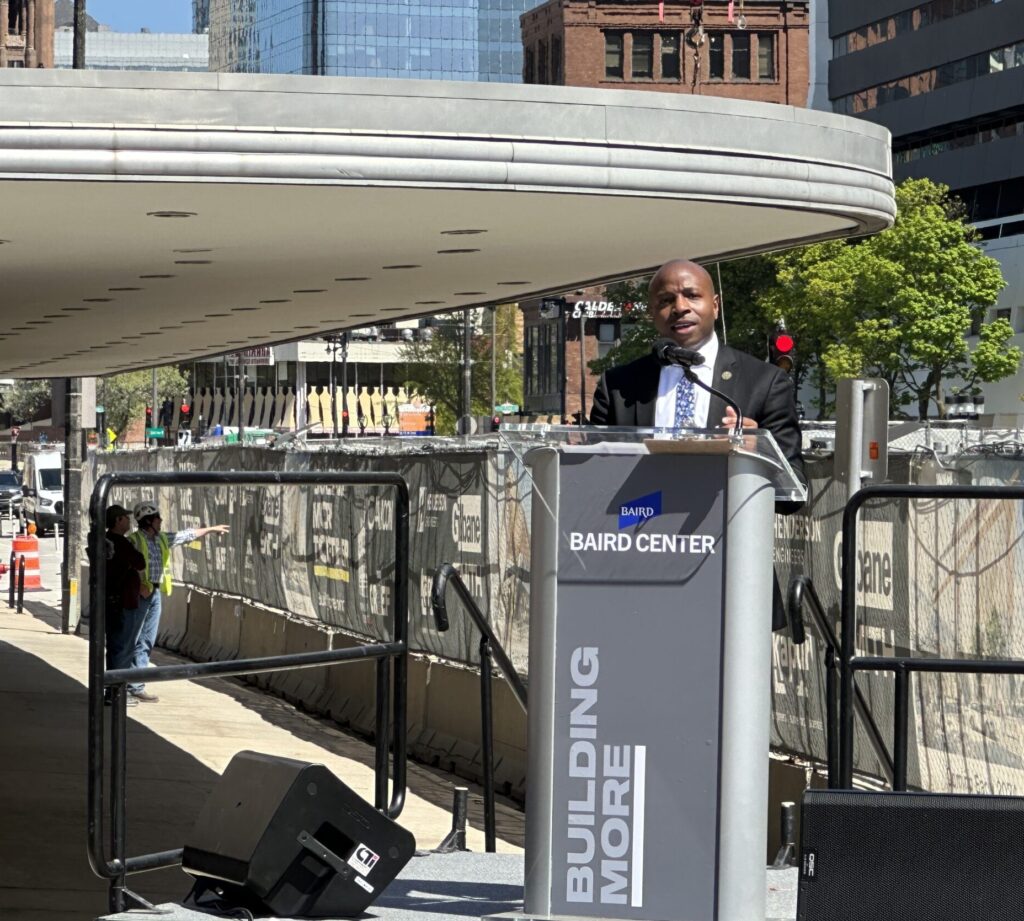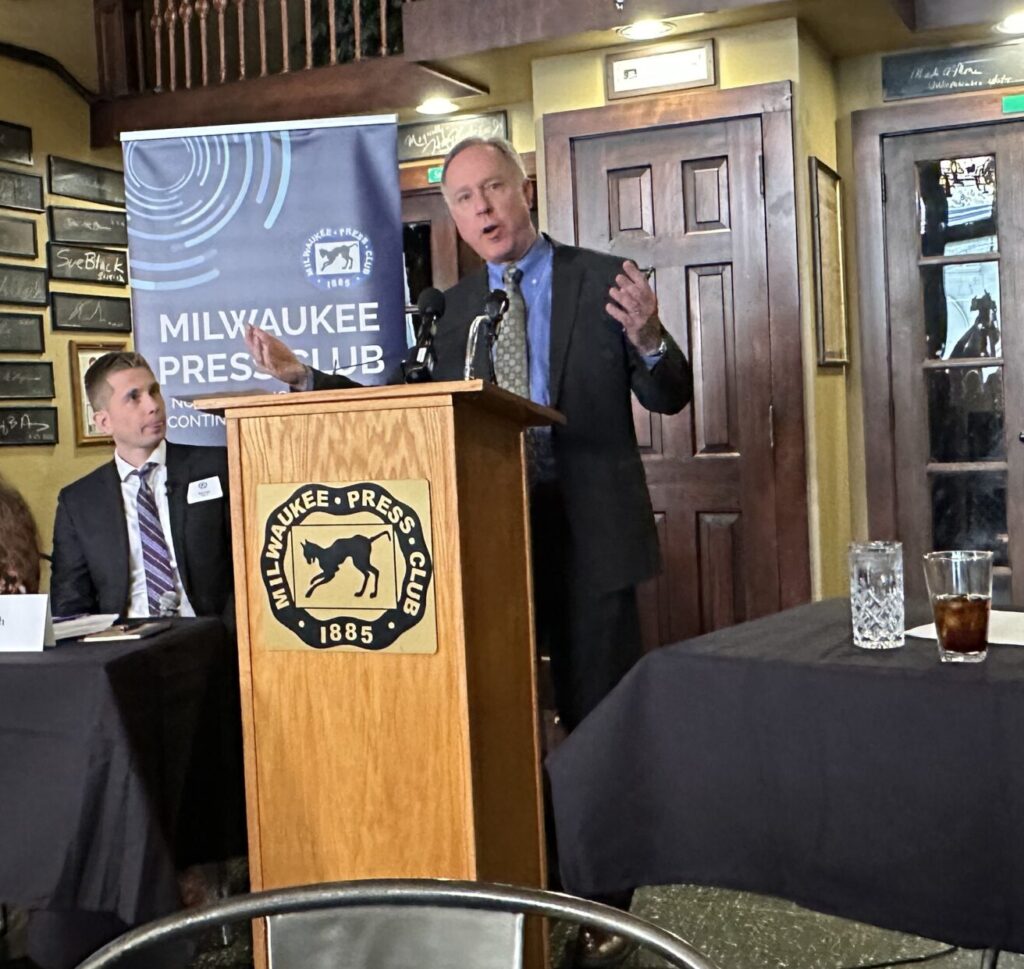Milwaukee Mayor: City bankrupt by 2025; Vos: Republicans ‘done negotiating’ local aid
By: Steve Schuster, [email protected]//May 18, 2023//
Milwaukee Mayor: City bankrupt by 2025; Vos: Republicans ‘done negotiating’ local aid
By: Steve Schuster, [email protected]//May 18, 2023//

By Steve Schuster and The Associated Press
As Wisconsin has more than a $6 billion surplus, cities across the state are struggling with a lack of local funding — Milwaukee is no exception. These funds are used to cover basic services, including police and fire protection, public works and emergency response communications.
Milwaukee Mayor Cavalier Johnson, along with leaders of other municipalities, warned lawmakers last week that the city faces bankruptcy by 2025 without help from Madison.
Despite the record surplus and city government scrambling for funds, Wisconsin Assembly Speaker Robin Vos said Wednesday that Republicans were “done negotiating” on a bill that would have increased state aid to local government.
Instead, Vos unveiled a new proposal that Democratic Gov. Tony Evers and the GOP-controlled Senate have yet to agree upon.
The Assembly passed the latest version, but Evers was not included in the discussion that led to the latest proposal, which boosts the increase in aid for local governments from at least 10% to 15%. However, there are certain provisions Milwaukee and Evers had objected to, including giving Milwaukee less funds than other cities throughout the Badger state. The city and county of Milwaukee would only see a 10% increase, but could ask voters for more.
“We are done negotiating,” Vos said. “We have negotiated in good faith literally for months.”
Democrats responded.
“With that, he and his Republican caucus walked out on weeks of good faith negotiations on the part of Governor Evers and Assembly Democrats, turning their backs on our local cities, towns, and villages,” said Rep. Lisa Subeck (D).

The Assembly passed it 56-36, with all Republicans in support except for three who joined all Democrats in opposing it. The measure now goes to the Senate, where its future is uncertain.
The bill to increase state aid to local governments will likely not have a provision calling for Milwaukee to get approval from voters before raising sales taxes, the Senate Republican majority leader said Thursday.
Republican Majority Leader Devin LeMahieu told The Associated Press that he does not expect that provision to be a part of the bill the Senate will pass, likely in early June.
Republican Senate Majority Leader Devin LeMahieu did not immediately return a message seeking comment from The Associated Press. Vos did not say if the Senate agreed to the latest version of the bill.
“Is this bill perfect? Hell no it’s not perfect,” said Republican Rep. Tony Kurtz, the measure’s sponsor. But he emphasized that Milwaukee officials, Democratic lawmakers, Evers and those representing cities, counties, towns and villages have all been involved with crafting the proposal.
Under the bill, $1.5 billion in aid to municipalities — known as shared revenue — would be paid for by tapping 20% of the state’s 5-cent sales tax, an idea Evers has supported. Aid would then grow along with sales tax revenue.
The bill would increase funding to counties, cities, towns and villages by $261 million — at least a 15% increase for everyone (except Milwaukee County) — over the next two years, but that could only be spent on police and fire protection, emergency medical services, emergency response communications, public works and transportation.
Evers’ spokesperson Britt Cudaback said the governor had not signed off on any changes and he looked forward to continuing negotiations, which he previously said he expected to take weeks more. Evers promised to veto the original bill.
Democratic Assembly Minority Leader Greta Neubauer, during Assembly debate, said the bill was “not ready for prime time.”
“We need to go back to the negotiating table and get it right,” Neubauer said. “We can and must do better.”
Under the bill, Milwaukee could levy a 2% sales tax and Milwaukee County could add 0.375% sales tax to its current 0.5% sales tax. One of the biggest sticking points has been whether Milwaukee taxpayers would have to approve that tax increase before it could be enacted. Milwaukee city and county officials don’t want to have to take it to a vote.
Under the Republican amendment, that requirement for taxpayer approval would remain. Democrats on a committee tried unsuccessfully earlier in May to remove portions of the bill unrelated to state aid to local governments, but Republicans rejected it.
Johnson warned lawmakers last week that the city faces bankruptcy by 2025 without help. He, along with groups representing municipalities, police and firefighters, as well as numerous mayors and other local officials, all testified in support of reaching a deal that increases funding.
Milwaukee, the state’s largest city and a Democratic stronghold, faces an underfunded pension system. Milwaukee has increasingly become reliant on federal pandemic aid to fund its essential services, which city leaders have said cost $150 million more per year to maintain.
Evers, and many of the local officials who testified last week, had complained that the proposal came with too many strings attached. Those include cutting aid to communities that reduce the number of police officers and firefighters and banning public health officials from ordering businesses closed for more than two weeks,
The Assembly amendment would allow health officials to close businesses for up to 30 days, with the local governing body able to extend that once for another 30 days.
The amendment also still bans local advisory referendum questions on everything except those for certain projects that would be funded with property tax money. The bill would not allow questions on hot-button issues like whether voters support abortion rights or legalizing marijuana.
It would also mandate that local governments approve projects under the state’s land stewardship program that are north of U.S. Highway 8, which runs across roughly the northernmost quarter of the state. Republicans have long raised concerns about such projects that protect the land from future development.
The shared revenue program to fund local governments, created in 1911, has remained nearly unchanged for almost 30 years, despite overall growth in tax revenues. Shared revenue for counties and municipalities was cut in 2004, 2010 and 2012 and since then has been relatively flat.
Legal News
- Wisconsin attorney loses law license, ordered to pay $16K fine
- Former Wisconsin police officer charged with 5 bestiality felony counts
- Judge reject’s Trump’s bid for a new trial in $83.3 million E. Jean Carroll defamation case
- Dozens of deaths reveal risks of injecting sedatives into people restrained by police
- The Latest: Supreme Court arguments conclude in Trump immunity case
- Net neutrality restored as FCC votes to regulate internet providers
- Wisconsin Attorney General asks Congress to expand reproductive health services
- Attorney General Kaul releases update at three-year anniversary of clergy and faith leader abuse initiative
- State Bar leaders remain deeply divided over special purpose trust
- Former Wisconsin college chancellor fired over porn career is fighting to keep his faculty post
- Pecker says he pledged to be Trump campaign’s ‘eyes and ears’ during 2016 race
- A conservative quest to limit diversity programs gains momentum in states
WLJ People
- Power 30 Personal Injury Attorneys – Russell Nicolet
- Power 30 Personal Injury Attorneys – Benjamin Nicolet
- Power 30 Personal Injury Attorneys – Dustin T. Woehl
- Power 30 Personal Injury Attorneys – Katherine Metzger
- Power 30 Personal Injury Attorneys – Joseph Ryan
- Power 30 Personal Injury Attorneys – James M. Ryan
- Power 30 Personal Injury Attorneys – Dana Wachs
- Power 30 Personal Injury Attorneys – Mark L. Thomsen
- Power 30 Personal Injury Attorneys – Matthew Lein
- Power 30 Personal Injury Attorneys – Jeffrey A. Pitman
- Power 30 Personal Injury Attorneys – William Pemberton
- Power 30 Personal Injury Attorneys – Howard S. Sicula











